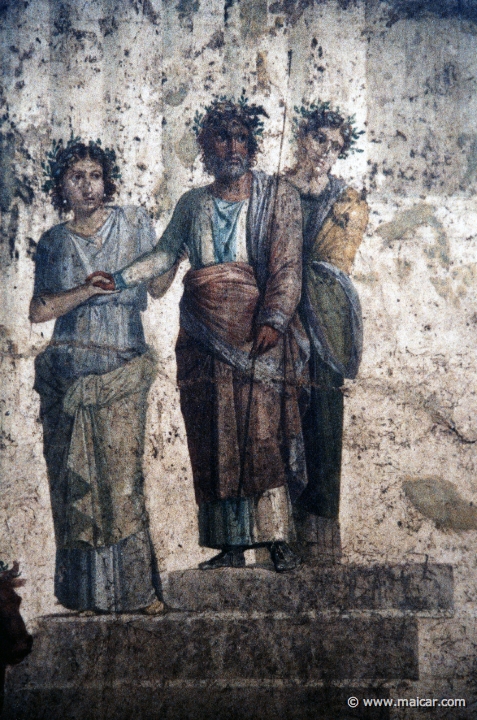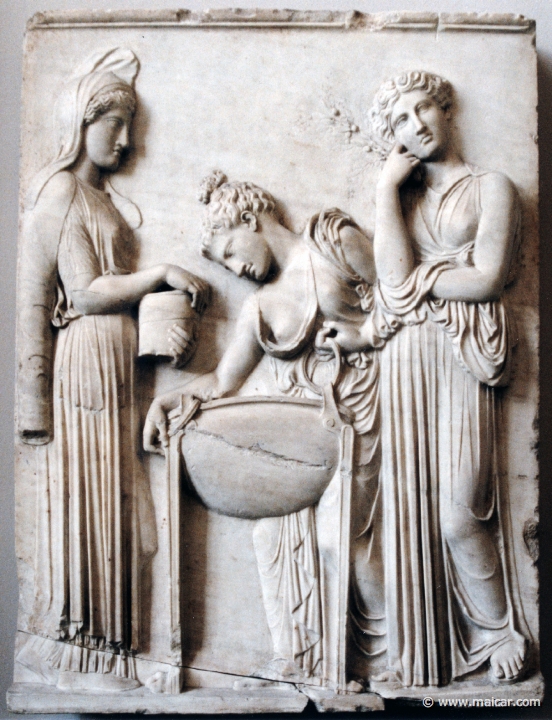|

|
Pelias 1 and two of his daughters. 7132: Jason recognised by Pelias and his daughters (detail: Pelias). Pompei, casa di Giasone o dell'Amor fatale (IX 5,18), triclinio (f). National Archaeological Museum, Naples.
|
|
|
"But she (Tyro) conceived and bore Pelias and Neleus, who both became strong servants of great Zeus; and Pelias dwelt in spacious Iolcus, and was rich in flocks, and the other dwelt in sandy Pylos. But her other children she, the queenly among women, bore to Cretheus, even Aeson, and Pheres, and Amythaon, who fought from chariots." (Homer, Odyssey 11.254).
"I murdered Pelias by the most horrible of deaths—at the hand of his own daughters—and I destroyed his whole house." (Medea to Jason. Euripides, Medea 485).
"… Pelias, that outrageous and presumptuous doer of violence …" (Hesiod, Theogony 995).
|
|
Pelias 1 is the king of Iolcus who bade Jason and the ARGONAUTS to go to
Colchis in quest of the Golden Fleece.
Uncertain fatherhood
There is no agreement concerning the paternity of Pelias 1, for some say that his father was Cretheus 1 (the son of Aeolus 1, son of Hellen 1, son of Deucalion 1, the man who survived the Flood), whereas others
assert that he was Poseidon. On the other hand, there is no controversy concerning his mother: she was Tyro, the daughter that Alcidice (daughter of Aleus, son of Aphidas 1, son of Arcas 1, son of Zeus and Callisto) bore to
impious Salmoneus (another son of Aeolus 1), the founder
of Elis.
Twins exposed
Now Zeus, tired of Salmoneus' arrogance struck him with a thunderbolt, and so Tyro was brought up by her uncle Cretheus 1, king of Iolcus (the city in Thessaly on the coast of the Gulf of Pagasae). Having later married the same uncle, she had children by him: Aeson (father of Jason), Amythaon 1, Pheres 1, and Talaus. But Pelias 1 and Neleus, she bore to Poseidon: For living in Thessaly, some say, Tyro fell in
love with the river god Enipeus, and as she came
often to the waters of the river to chant her love, Poseidon, taking the
form of the river, lay with her. Since this had
been done in secret, she, on giving birth to the
twins Neleus and Pelias 1, abandoned them, but when they were exposed, a horse-keeper found them and saved them. Yet, one of the mares kicked with its hoof one of the children, leaving a livid mark on his face, and because of this mark the child was called Pelias. But others have said that they were found by an
old goat-herd, who, noticing that the children were
of a better stock than himself, took them home
years later, giving them the little leather bag of
tokens by which they were recognized. Others have
said that Tyro recognized the children she had once
exposed by the boat or ark in which she had placed
them.
His fate sealed in his youth
Otherwise, it is told that Neleus and Pelias 1 were reared by Sidero, their stepmother and Salmoneus' second wife, and while they lived in Elis, some say, they held
the Olympian games after Aethlius, the father of Endymion. Now, this Sidero treated Tyro unkindly; so when
the twins, being grown-up, discovered the truth
about their mother, they attacked Sidero, who took
refuge in the precinct of Hera to no avail; for Pelias 1, caring nothing about the holiness of the shrine, killed her on the altars. In such manner he incurred the hate of the goddess, thereby setting up a firm base for his own destruction. After Sidero's death, the twins fell out and Neleus, banished by Pelias 1 from Iolcus, migrated to Messenia, where he was received by Aphareus 1. And whereas Amythaon 1 went to Pylos, Pheres 1 founded Pherae, and Talaus settled in Argos, Aeson and Pelias 1 stayed in Iolcus nurturing their rivalry with regard to Cretheus 1's throne.
The single sandal
When Cretheus 1 died, Pelias 1 seized the throne, but feeling a certain unease, he consulted the oracle concerning the kingdom, being warned that his death was drawing near if a man arrived wearing only one sandal. At first, the king did not understand whom the oracle was referring to, but afterwards, when he was about to offer a sacrifice to Poseidon, he sent
for Jason, among many
others, to participate in it. Jason came to the sacrifice, but in crossing the river Anaurus in Thessaly (or the Evenus in Aetolia) he lost a sandal in the stream and appeared with only one. When Pelias 1 saw him, he remembered the oracle, and asked Jason what would
he do if he were king and had received an oracle
that he should be murdered by a certain citizen. Jason answered:
"I would
command him to bring the Golden Fleece." (Jason to Pelias 1. Apollodorus, Library 1.9.16).
Some say that he answered thus inspired by Hera, who being angry against Pelias 1 because of his violation of her sanctuary, wished Medea to prove a curse to Pelias 1. And that came to be, for Pelias 1, having heard Jason's answer, bade him
go in quest of the Golden Fleece, and Jason, on his return to
Iolcus, brought Medea, who caused the death of this anxious king. And it has also been said that Hera changed her form to
that of an old woman near the river Evenus,
watching if someone would carry her across the
river. No one offered her help until Jason took her across. But the goddess, planning the downfall of Pelias 1, caused Jason to leave one sandal in the mud. Others have represented the arrival of Jason as that of a stranger, unknown to Pelias 1, affirming that the latter asked:
"What country,
stranger, do you claim as your fatherland? And what
woman, of mortals on earth, bore you from her aged
womb? Do not befoul your story with most hateful
lies, but tell me of your birth." (Pelias 1 to Jason. Pindar, Pythian Odes 4.95).
Yet it could be argued that Jason was the son of Pelias 1's half brother Aeson, and therefore well known to him. All this is made plain by Jason, who replies:
"For I hear
that lawless Pelias, yielding to his empty mind,
violently robbed it from my parents, who were the
rulers by right." (Jason to Pelias 1. Pindar, Pythian Odes 4.110).
On the other hand, it is also said that Jason had been away while
he was being instructed by the divine centaur Chiron. When they knew
who they were, Jason came to the palace with an armed force demanding the royal sceptre. And it was then, they say, that Pelias 1 promised to deliver the throne to him, if he would remove the anger of the gods by fetching the Golden Fleece (the soul of Phrixus 1), as an oracle in Delphi had
ordained.
"Willingly
fulfill this quest, and I swear that I will deliver
up to you the royal power and the kingdom." (Pelias 1 to Jason.
Pindar, Pythian Odes 4.165).
That is what King Pelias 1 said, and all agreed.
Extermination of Jason's family
In any case, Pelias 1, despairing of the return of Jason, caused the death of his father Aeson, and those of his mother and brother Promachus 2, still an infant. According to some, Aeson asked to be allowed to take his own life, and his request being granted, he drank of a bull's blood and died. His wife hanged or stabbed herself after cursing the man who caused her to die, and little Promachus 2 was slain by Pelias 1. This is what Jason found at his return. Nevertheless he surrendered
the Golden Fleece, and bided his time, sailing with
the ARGONAUTS to the
Isthmus of Corinth to
dedicate the ship to Poseidon.
|

|
2131: Medea and the daughters of Pelias, 420-410 BC. Pergamon Museum, Berlin.
|
|
Death of Pelias 1
But when this was done, he asked Medea to devise revenge on Pelias 1. This is why she appeared at the king's palace disguised as a priestess of Artemis, and having met the king's daughters, persuaded them to cut their father into pieces and boil him, promising that this bizarre procedure, added to her drugs, should make the old man young again. Now, who, some may ask, could be so naïve to believe in such absurd promises? Could that perchance be some girls from ancient times? For as some suppose, ancient girls were not as smart as modern ones, who defend themselves very nicely against deceivers, and in addition may carry powerful weapons to secure their own defence. Yes, they were "ancient." But Medea did not underrate the girls (who at that time were not "ancient"), and in order to win their confidence, she cut up a ram and made it into a lamb by boiling it, probably saying, "Do you believe me now?" Being persuaded by such a strong evidence, they then made mince meat of their father and boiled him, as the witch had instructed them to do. Others say that Medea cast mist before them, and by means of drugs formed phantoms that looked real, putting an old ram in a brazen vessel, from which a young lamb seemed to come forth. And so, all the daughters of Pelias 1 (including the noble Alcestis, some affirm)
slew their father and cooked him in a brazen
caldron. When the girls realized they had been
deceived, they fled from the country. It is said
that Jason then made
himself master of the palace at Iolcus, and handed
over the rule to Acastus, himself departing freely
with Medea to Corinth (instead of
being expelled by Acastus, as others assert). But
it has also been said that Jason, moved from Iolcus to Corcyra after the death of Pelias 1. In any case, it is told that when the daughters stood around Pelias 1's bed, they hesitated, but Medea encouraged them
saying:
"Come, draw
your swords, and let out his old blood that I may
refill his empty veins with young blood again. In
your own hands rests your father's life and youth." (Medea to the daughters of Pelias 1. Ovid, Metamorphoses 7.333).
And as the poet says, they did the wicked deed in order not to be wicked by denying youth to their father. And they turned their eyes away as they struck the deadly blows. And having plunged Pelias 1's body into the boiling water, Medea escaped through the
air drawn by her winged dragons.
Funeral games
That was the end of Pelias 1. Apparently, Jason and Medea could not be charged with murder (for the girls had killed their own father), but as instigators they suffered the rather lenient punishment of exile, being expelled from Iolcus by Acastus, son of Pelias 1. It was at the games held in honour of Pelias 1 that Atalanta wrestled
with Peleus and won. And it was when Zetes and Calais—the winged sons of Boreas 1 (see WINDS and Phineus 2)—were returning from the same funeral games that Heracles 1 killed them
in Tenos (one of the Cyclades Islands) for having
persuaded the ARGONAUTS to leave him behind in Mysia (the northwestern part of Asia Minor). It was also in these funeral games that Glaucus 1, son of Sisyphus, was devoured
by his own mares.
Another with identical name.
Pelias 2 is son of Aeginetes 1, son of Dereites, son of Harpalus 1, son of Amyclas 1, son of Lacedaemon, son of Zeus and
Taygete.
|